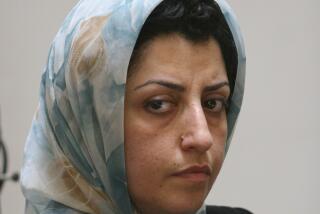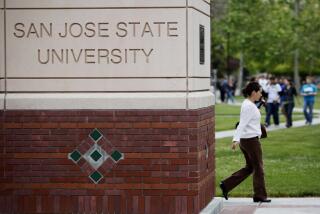Egyptian American Scholarâs Arrest in Cairo Alarms U.S., Rights Groups
CAIRO â As the United States was celebrating its liberty Tuesday, a prominent Egyptian American scholar was under lock and key in Cairo while police investigated charges related to a documentary he was making about free elections.
The unexpected arrest last week of Saad Eddin Ibrahim, a sociologist and one of this countryâs leading exponents of tolerance toward the Coptic Christian minority, sent a shiver through the ranks of independent civic organizations here.
It appears to be another stroke by the authorities against pro-democracy organizations that say President Hosni Mubarakâs government has failed to achieve greater substance to back up the countryâs democratic claims.
Ibrahim, an Egyptian national who also holds U.S. citizenship, was taken into custody Friday. The sociology professor at American University in Cairo is being held for 15 days while police investigate charges that he defamed Egypt and received money from foreign parties, including the United States and the European Union.
Police also ordered eight employees of his think tank detained.
In a statement, the Egyptian Organization for Human Rights accused the government of âterrorism against civil society institutions to deplete their resources and discourage them from defending human rights or backing democracy.â
Ibrahim is the founder of the Ibn Khaldoun Center for Development Studies, named for a progressive Islamic thinker of the 14th century. He received his masterâs and doctorate at the University of Washington in Seattle and taught for one year at UCLA as a visiting professor in 1980. He also taught for a time at DePauw University in Indiana.
According to his lawyer, Ibrahim has been accused of receiving funds from the European Union for a documentary on the election process that was regarded as âharming Egyptâs reputation.â
Some observers in the region have written that the arrest was aimed at nipping in the bud attempts by pro-democracy groups to monitor general elections in November for fairness. The conduct of elections in the past has favored Mubarakâs ruling New Democratic Party.
Hafez abu Saada, Ibrahimâs lawyer and head of the Egyptian human rights organization, said he sees an even broader strategy by the state.
âThere is a general tendency by the state, now that the campaign against the militant [Islamic] groups has waned, to turn their sights on the human rights groups. It is a disturbing reality and a very pessimistic one for the prospects of moving toward democracy in Egypt,â Abu Saada said.
Germaine Demian, press officer of the European Commission here, said her organization does not know yet what to make of the objections to the documentary, which she said was an aboveboard and legal project.
âItâs very ambiguous. Under the framework of an agreement between the government and the EU, we do have the right to fund out-of-government organizations,â she said.
A contract existed between the EU and the Ibn Khaldoun center, she said, adding that the documentary was intended to encourage the young and the illiterate to vote.
The total EU funding was at least $160,000, but only a portion of that was meant for the film, she said. The commission had hoped that the government would allow the documentary to air on state television.
The Ibn Khaldoun center made a similar film, âDays of Democracy,â in 1994, Demian said, but in that case, the film had the blessing of the presidentâs wife, Suzanne Mubarak, and was subsequently broadcast.
The U.S. Embassy said that a consular officer had visited Ibrahim in Cairoâs Liman Tora Prison and that the professor appeared to have been well treated. âAny time you have an American citizen arrested, you are interested on a consular basis,â said spokesman David Ballard. âWe want to see due process.â
U.S. Ambassador Daniel Kurtzer also had raised the issue of the arrest âwith a number of senior officials, including the prime minister,â Ballard said.
Egypt is one of the main U.S. allies in the Arab world and annually receives about $2 billion in American military and development aid, more than any other country except Israel. Nevertheless, Egyptian officials bristle at accusations that their country must bow to American requests.
Contacted at their home Tuesday, Ibrahimâs American-born wife, Barbara, said she was putting her faith in the judicial system to âdo the right thing and release him.â
âIâve lived in Egypt for 25 years. It is my home,â she said. âI never thought I would see something like this happening to a respectable academic.â
More to Read
Sign up for Essential California
The most important California stories and recommendations in your inbox every morning.
You may occasionally receive promotional content from the Los Angeles Times.










